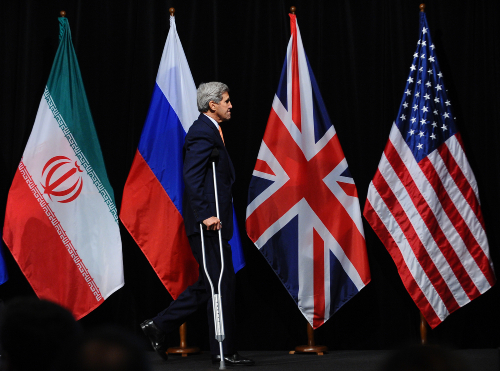|
 |
|
U.S. Secretary of State John Kerry attends the group photo shooting after the signing of a nuclear deal with Iran in Vienna, Austria, on July 14 (XINHUA) |

While Iran's recent nuclear deal has brought the prospect of easing tensions over the country's nuclear ambitions, the international community has started to shift attention to Pyongyang in the hope that a similar approach can settle the nuclear deadlock in the Northeast Asian country. The two cases do have much in common, but the Iranian nuclear agreement cannot serve as a template for the North Korea situation. The breakthrough in the Iranian nuclear issue has probably highlighted the real difficulty of the Korean case. It is only by fully analyzing the successes and failures of both cases that the international community can restart negotiations on the Korean nuclear issue.
A breakthrough
U.S. President Barack Obama hailed the nuclear agreement with Iran as the toughest nuclear deal in history. It is a deal that is so stringent that none of the North Korea-related nuclear agreement—DPRK-U.S. Nuclear Agreed Framework or the deal reached at the Six-Party Talks—can transcend.
Although Iran has been insisting for decades on its rights to develop nuclear energy, its declaration that it would never seek to develop nuclear weapons formed the basis for the conclusion of such an agreement. With nuclear weapons not being a goal for Iran, an agreement that prevents the development of such weapons is acceptable to Iran in principle, however strict as the clauses of the newly signed agreement may be.
The decisive factor contributing to the birth of the Iranian nuclear deal was the willingness by the United States to give up, albeit temporarily, the option to settle the issue by force.
Washington has long regarded Teheran as its major rival in the Middle East by going as far as threatening possible recourse to military action to resolve Iran's nuclear problem. However, it was then forced to change this aggressive stance due to an evolving strategic environment.
For one thing, the U.S. policy in the Islamic world of turning one denomination against the other has made the Middle East a more dangerous place, plagued by a rampant spread of terrorism. Now, it has to solicit help from Teheran to combat the rapidly rising Middle-East extremist organization—the Islamic State.
For another, the Obama administration's "pivot to Asia" strategy will need to mobilize two thirds of the U.S. overseas military forces to the Asia-Pacific region to balance the rise of China. As a consequence, the United States quickly needs to ease its burden in the Middle East—to be specific, the hostile situation between itself and Iran. In a recent speech to the U.S. Congress, Obama compared accepting or blocking the Iran nuclear deal to the choosing between peace and war. As the United States is unwilling to opt for war, accepting such a deal with Iran is beyond any doubt the best choice.
A lesson from the past
The implementation of the Iran nuclear deal is due to pass through a number of phases. Transition Day will take place eight years from Adoption Day, and Termination Day two years later. Anything could happen within such a long time span. In this sense, the signing of the deal is only the start of solving the problem rather than putting an end to it. The lessons of the Korean nuclear issue should be well heeded to make the Iran nuclear deal an eventual success.
In explaining the Iranian nuclear deal to the U.S. public and Congress, the Obama administration stressed that the deal would grant the International Atomic Energy Agency (IAEA) power to question and inspect Iran "anytime, anywhere." The statement that the United States has the legitimate right to doubt and appeal to the IAEA for verification of Iran's future compliance used to be one of the major disagreements between the two sides. Iran held that some sensitive military facilities should not be subject to inspections by a foreign agency because of fears of intelligence leaks. Although the agreement grants Iran the right to appeal to the relevant six parties, it could barely prevent possible ill-intentioned accusations from the United States.
Essentially, the deal is an exercise in nuclear supervision and devoid of political reconciliation. It faces strong opposition within the United States, as well as a backlash from Washington's key allies in the Middle East. The U.S. attitude toward the implementation of the deal is crucial to its final success. Domestic partisan battles and changes in the international political environment may see the deal used in a malicious way. It is a customary tactic of the United States to point the finger at an antagonist for political gain. A typical case in point is that by accusing Saddam Hussein's regime in Iraq of possessing weapons of mass destruction, the United States launched the second Iraq war. No such weapons were found after the downfall of the regime, but what mattered most to the United States was achieving the removal of Saddam Hussein.
The United States also utilized the phrase "anytime, anywhere" in the 1994 U.S.-North Korean Nuclear Accord to demand continual verification of the sensitive facilities in North Korea. In 1998, U.S. intelligence claimed that Kumchang-ri was an underground nuclear facility and Pyongyang was accused of violating the accord. An investigation led by the United States failed to find any trace of nuclear activity and concluded that Pyongyang had not violated the accord, but the damage had already been done, and eventually led to the total abandonment of talks. Of course, structural defects in the accord cannot be ignored. Nevertheless, the Six-Party Talks failed to transcend what some termed an inevitable stalemate of discord and disillusionment, with neither party involved so much as acknowledging what they had in fact agreed upon. For instance, soon after the signing of the Joint Statement of the Fourth Round of the Six-Party Talks on September 19, 2005, a positive step for the settlement of the Korean nuclear crisis, the United States announced a new round of financial sanctions on Pyongyang in the name of anti-money laundering, which dealt a heavy blow to the agreement in its infancy. Despite efforts to retrieve the situation, it became extremely hard to rebuild trust after it was broken. What's more, Japan added fuel to the flames by refusing to perform the obligations written in the joint statement, which further weakened Pyongyang's confidence in the Six-Party Talks.
A deal not in sight
The Korean issue differs from its Iranian counterpart not only in terms of national characteristics but also because of different geo-strategic environments. More importantly, they have different relationships with their common opponent—the United States. Despite a hostile relationship between Washington and Teheran, they are not in a state of war and can negotiate with each other peacefully. With no peace treaty signed after hostilities ended in the Korean War, Washington and Pyongyang are technically still at war, and Washington has been constantly updating its war plan against North Korea since its vain attempt to subvert the Pyongyang administration after the Cold War. Washington seems reluctant to enter a two-way dialogue toward peace with its inclusion of North Korea on its list of nuclear weapons states to be cracked down upon, and its requirement that North Korea clears itself of nuclear weapons and gives up the right to the peaceful use of nuclear power. Such a policy is not conducive to attaining peace because it pushes North Korea into a corner.
North Korea is different from Iran in that it is already a de facto nuclear weapons state. Thus, the United States must take a seismic policy shift like what it has done with Cuba and Iran before it can reach an agreement with North Korea. Recent moves with Cuba and Iran have shown that the United States is readjusting its major strategies but that does not equate to a fundamental change in Washington's strategic thinking. The old ways persists—taking advantage of existing conflicts and making waves to enforce Washington's hegemonic rationale. By concentrating its superior military forces in the economic ally booming Asia-Pacific region, the United States is trying to ensure its dominant regional and even global position. In doing so, it is ramping up tension in the Asia-Pacific region. The increasing U.S. military presence and Japan's move to become militarily involved in regional affairs by breaking its pacifist Constitution have further complicated the situation.
Against this backdrop, it is unforeseeable that Washington can make much change to its policy toward North Korea, making it even harder to persuade Pyongyang to go back to the path of denuclearization.
The author is an associate research fellow with China Institute of International Studies
Copyedited by Calvin Palmer
Comments to liuyunyun@bjreview.com | 